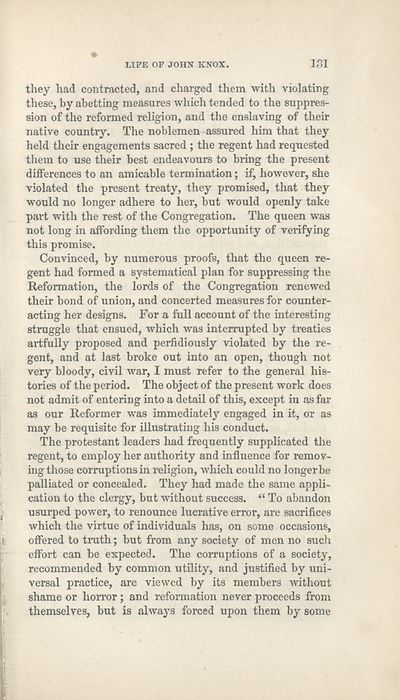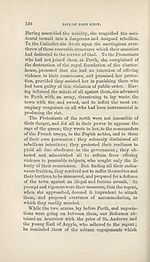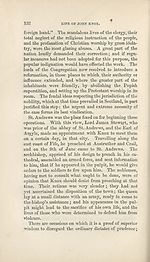Download files
Complete book:
Individual page:
Thumbnail gallery: Grid view | List view

LIFE OF JOHN KNOX.
131
they had contracted, and charged them with violating
these, by abetting measures which tended to the suppres¬
sion of the reformed religion, and the enslaving of their
native country. The noblemen assured him that they
held their engagements sacred ; the regent had requested
them to use their best endeavours to bring the present
differences to an amicable termination; if, however, she
violated the present treaty, they promised, that they
would no longer adhere to her, but would openly take
part with the rest of the Congregation. The queen was
not long in affording them the opportunity of verifying
this promise.
Convinced, by numerous proofs, that the queen re¬
gent had formed a systematical plan for suppressing the
Reformation, the lords of the Congregation renewed
their bond of union, and concerted measures for counter¬
acting her designs. For a full account of the interesting
struggle that ensued, which was interrupted by treaties
artfully proposed and perfidiously violated by the re¬
gent, and at last broke out into an open, though not
very bloody, civil war, I must refer to the general his¬
tories of the period. The object of the present work does
not admit of entering into a detail of this, except in as far
as our Reformer was immediately engaged in it, or as
may be requisite for illustrating his conduct.
The protestant leaders had frequently supplicated the
regent, to employ her authority and influence for remov¬
ing those corruptions in religion, which could no longer be
palliated or concealed. They had made the same appli¬
cation to the clergy, but without success. “ To abandon
usurped power, to renounce lucrative error, are sacrifices
which the virtue of individuals has, on some occasions,
offered to truth; but from any society of men no sucli
effort can be expected. The corruptions of a society,
recommended by common utility, and justified by uni¬
versal practice, are viewed by its members without
shame or horror; and reformation never proceeds from
themselves, but is always forced upon them by some
131
they had contracted, and charged them with violating
these, by abetting measures which tended to the suppres¬
sion of the reformed religion, and the enslaving of their
native country. The noblemen assured him that they
held their engagements sacred ; the regent had requested
them to use their best endeavours to bring the present
differences to an amicable termination; if, however, she
violated the present treaty, they promised, that they
would no longer adhere to her, but would openly take
part with the rest of the Congregation. The queen was
not long in affording them the opportunity of verifying
this promise.
Convinced, by numerous proofs, that the queen re¬
gent had formed a systematical plan for suppressing the
Reformation, the lords of the Congregation renewed
their bond of union, and concerted measures for counter¬
acting her designs. For a full account of the interesting
struggle that ensued, which was interrupted by treaties
artfully proposed and perfidiously violated by the re¬
gent, and at last broke out into an open, though not
very bloody, civil war, I must refer to the general his¬
tories of the period. The object of the present work does
not admit of entering into a detail of this, except in as far
as our Reformer was immediately engaged in it, or as
may be requisite for illustrating his conduct.
The protestant leaders had frequently supplicated the
regent, to employ her authority and influence for remov¬
ing those corruptions in religion, which could no longer be
palliated or concealed. They had made the same appli¬
cation to the clergy, but without success. “ To abandon
usurped power, to renounce lucrative error, are sacrifices
which the virtue of individuals has, on some occasions,
offered to truth; but from any society of men no sucli
effort can be expected. The corruptions of a society,
recommended by common utility, and justified by uni¬
versal practice, are viewed by its members without
shame or horror; and reformation never proceeds from
themselves, but is always forced upon them by some
Set display mode to:
![]() Universal Viewer |
Universal Viewer | ![]() Mirador |
Large image | Transcription
Mirador |
Large image | Transcription
| Antiquarian books of Scotland > Scotland/Scots > Life of John Knox ; and, The life of Alexander Henderson > (149) |
|---|
| Permanent URL | https://digital.nls.uk/131834092 |
|---|
| Description | Thousands of printed books from the Antiquarian Books of Scotland collection which dates from 1641 to the 1980s. The collection consists of 14,800 books which were published in Scotland or have a Scottish connection, e.g. through the author, printer or owner. Subjects covered include sport, education, diseases, adventure, occupations, Jacobites, politics and religion. Among the 29 languages represented are English, Gaelic, Italian, French, Russian and Swedish. |
|---|

